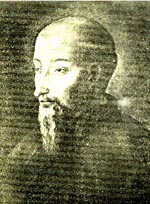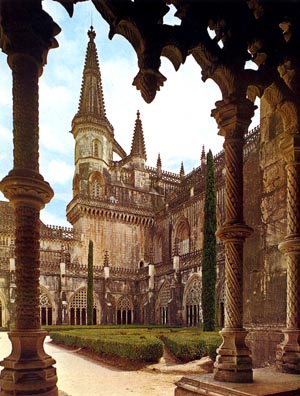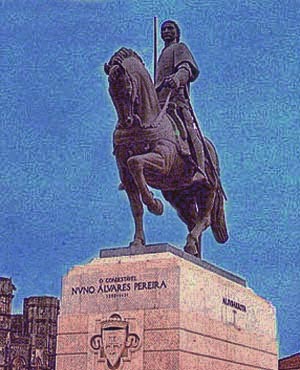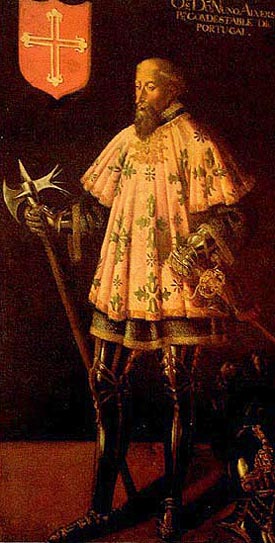 |
The Saint of the Day
Blessed Nuno Alvares Pereira, November 6
Prof. Plinio Corrêa de Oliveira
Biographical selection:

Nuno Alvares Pereira |
Nuno Alvares Pereira was born in 1360 at Bom Jardim near Lisbon, Portugal. He married at age 17, and was named commander of Portugal’s armies when he was 23 by the Grand Master of the Knights of Aviz, who became King John I. These Portuguese knights took up arms to keep from falling under Spanish domination. Under Blessed Nuno’s command, the tide was turned and Portugal triumphed at the Battle of Aljubarrota in 1385, when the Castilian forces were defeated by a smaller but better-organized Portuguese army. After the death of his wife, Nuno became a Carmelite monk in a monastery he had founded in Lisbon. Called the Constable, he is one of the great heroes of Portugal.
The first military campaigns of Nuno Alvares Pereira were, according to his own words, simple skirmishes on the borders of Portugal. He was an impetuous and brave young man who soon showed himself to be an excellent leader.
On a certain occasion, for example, a great Castilian fleet had appeared in Lisbon to blockade its port and invade the city. One day Nuno Alvares came upon 250 Castilians who were coming ashore from their boats. He gathered 60 men and went to face them. He and a few knights charged them in an attack, but the rest of his company remained behind in fear.

Above, the Monastery of Batalha, built in honor of Our Lady who gave the Portuguese the victory over the Castilians at the Battle of Aljubarrota.
Below, a statue of Blessed Nuno,
outside Batalha Monastery
 |
His horse was wounded and fell on his leg, trapping him. When the Castilians saw the Portuguese commander in this position, they took courage and made a strong counter-attack. But when the rest of the Portuguese combatants saw that Nuno had continued to attack the enemy, even from the ground, they took courage and began to fight, entering the fray with great fury. Although the Portuguese were outnumbered four to one, under Nuno’s command they put the Castilians to flight and killed almost all.
On August 15, 1423, Nuno was admitted into the Carmelite Order as a simple monk under the name of Nuno de Santa Maria [Nuno of St. Mary]. He became a great religious, just as he was a great soldier. With him in the monastery was a priest who, before his ordination, had been a soldier and served under Nuno’s command. When he used to pass, the monk Nuno would kiss the mantle of the priest as a sign of respect for his dignity. In his turn, the priest used to say that one of the greatest honors of his life had been to serve as a page of the Constable.
During the last year of his life, Nuno was visited by King John I, who embraced him for the last time. The King wept, for he considered Nuno his closest friend, the one who had put him on the throne and established with him the Royal House of Bragança.
When Nuno realized his last hour had arrived, he asked that the Passion of Our Lord from the Gospel of St. John be read aloud. He expired as the lector pronounced Our Lord’s words from the Cross: “Ecce Mater Tua.” [Behold Thy Mother] Blessed Nuno was renowned for his devotion to Our Lady and did much to spread the devotions of the rosary and scapular in Portugal.
On his tomb one can read this epitaph:
"Here lies that famous Nuno, the Constable, founder of the House of Bragança, excellent general, blessed monk, who during his life on earth so ardently desired the Kingdom of Heaven that after his death, he merited the eternal company of the Saints. His worldly honors were countless, but he turned his back on them. He was a great Prince, but he made himself a humble monk. He founded, built and endowed this church in which his body rests."
Comments of Prof. Plinio:
The episodes narrated in this selection are very significant.
First, in the monastery, there was the beautiful reciprocity of respect between the Constable – now a monk – and the priest – formerly a page. When the priest used to pass, Nuno would rise and go to pay homage to him as a priest. The latter was honored to have been a page of Dom Nuno Alvares Pereira when they were in the world. The Catholic spirit is one that rejoices in recognizing the superiority of others. In that time such joy was manifested in signs and addresses of mutual respect and admiration, which added great valor to Christian Civilization.
Second, you can see how Dom Nuno went to battle with the energy of his whole personality, communicating his courage to all the others. He was the opposite of that kind of soft, sentimental usher we know from so many churches, the kind who appears timid and fearful, turned primarily toward his small spiritual interests. Dom Nuno showed how the true Catholic warrior should carry himself and fight with courage, communicating strength to his companions.

Dom Nuno showed how the true Catholic warrior should carry himself and fight with courage, communicating strength to his companions |
Third, the adieu of the King to Blessed Nuno was also magnificent. At that time you can see that persons had no fear of death. It was frequent for a man to have a presentiment of his approaching end. If he were strong enough, he would visit his close friends and relatives to say farewell. Likewise, the persons who knew him would be advised so that they could come to visit and say a final adieu. Everyone took this naturally, because people had faith. The persons who would remain in this life used to ask favors of the one who was dying: “I ask that you recommend me to Our Lady.” “When you will see my patroness, please remind her that I still need this and that.”
It was a time of courtesy, and people even used to die politely and elegantly. If someone was leaving this earth, the polite thing to do was to visit him and say farewell. He would express his gratitude, give or receive some good counsel, show his esteem for the last time. This was why the King went to visit Blessed Nuno. Dom John wanted to manifest his friendship for Blessed Nuno Alvares Pereira. Seeing him, the King wept, they embraced, and then each one went his own way. Nuno Alvares died, and in Heaven prayed for the King, his friend.
It was a time of graceful manners. You can see how such elegance and virtue go well together and bestow a mutual excellence, one to the other. This excellence comes from the tranquility that exudes from a society of souls that lives with its eyes directed to Heaven.
Let us ask Blessed Nuno Alvares Pereira to give us his courage and his piety to fight for the cause of Our Lady and the Holy Church so threatened in our days, even when we must fight against great odds. Also let us ask Our Lady to restore Christendom and establish her Reign, so that those magnificent values that existed in the time of Blessed Nuno can once again shine in society.


  | | Prof. Plinio Corrêa de Oliveira | |
The Saint of the Day features highlights from the lives of saints based on comments made by the late Prof. Plinio Corrêa de Oliveira. Following the example of St. John Bosco who used to make similar talks for the boys of his College, each evening it was Prof. Plinio’s custom to make a short commentary on the lives of the next day’s saint in a meeting for youth in order to encourage them in the practice of virtue and love for the Catholic Church. TIA thought that its readers could profit from these valuable commentaries.
The texts of both the biographical data and the comments come from personal notes taken by Atila S. Guimarães from 1964 to 1995. Given the fact that the source is a personal notebook, it is possible that at times the biographic notes transcribed here will not rigorously follow the original text read by Prof. Plinio. The commentaries have also been adapted and translated for TIA’s site.
|
Saint of the Day | Home | Books | CDs | Search | Contact Us | Donate

© 2002- Tradition in Action, Inc. All Rights Reserved
|
 |

|